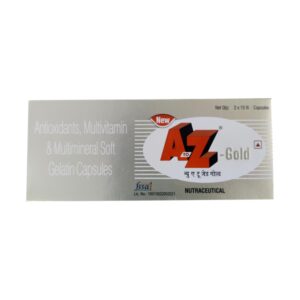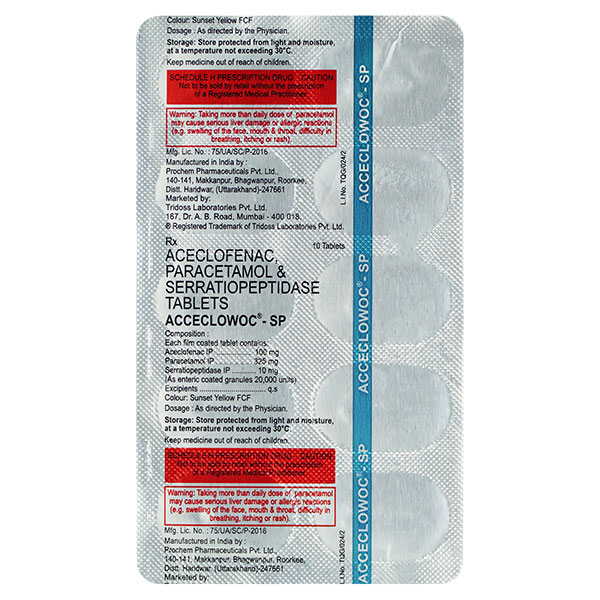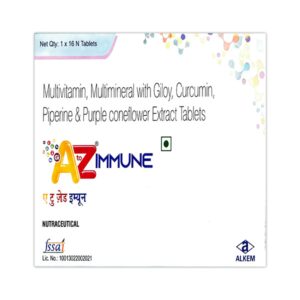ACCECLOWOC SP TABLET 10S – Effective Pain Relief with Aceclofenac, Paracetamol, and Serratiopeptidase.
Key Features and Benefits:
- Triple Action Relief: Each ACCECLOWOC SP TABLET 10S contains a carefully balanced combination of Aceclofenac, Paracetamol, and Serratiopeptidase. This powerful trio works synergistically to deliver effective pain relief, reduce inflammation, and promote faster healing.
- Aceclofenac (100mg): A nonsteroidal anti-inflammatory drug (NSAID), Aceclofenac targets the root cause of pain and reduces inflammation at the source. By inhibiting specific enzymes, it helps alleviate pain and improve mobility.
- Paracetamol (325mg): Known for its analgesic and antipyretic properties, Paracetamol provides immediate relief from pain and effectively reduces fever. It acts as a powerful pain reliever, ensuring your discomfort is kept at bay.
- Serratiopeptidase (10mg): Serratiopeptidase is a natural enzyme that acts as an effective anti-inflammatory agent. By breaking down proteins that contribute to swelling and inflammation, it promotes the healing process and reduces the recovery time.
₹133.00
CompareProduct Introduction:
The combination of ACCECLOWOC SP TABLET and Serratiopeptidase (10mg) is a pharmaceutical formulation that combines three active ingredients with complementary actions. Aceclofenac is a nonsteroidal anti-inflammatory drug (NSAID) with analgesic and anti-inflammatory properties, Paracetamol is an analgesic and antipyretic agent, and Serratiopeptidase is an enzyme with anti-inflammatory and fibrinolytic properties. This combination is often prescribed to manage pain and inflammation associated with various conditions, and Serratiopeptidase may contribute to reducing swelling and improving tissue healing.
Acceclowoc-SP Tablet should be taken in the dose and duration as advised by your doctor. It should be taken with food or milk to prevent stomach upset. Taking the medicine regularly at the right times increases its effectiveness. It is important to keep taking the medicine regularly until your doctor tells you it is safe to stop.
Nausea, vomiting, stomach pain, indigestion, heartburn, increased liver enzymes, dizziness,
drowsiness, and diarrhea are some of the common side effects that might be observed on taking this medicine. Your doctor may regularly monitor your kidney function, liver function, and levels of blood components if you are taking this medicine for long-term treatment. Long-term use may lead to serious complications such as stomach bleeding and kidney problems. Acceclowoc-SP Tablet is not recommended if you are pregnant or breastfeeding.
Benefits:
- Pain Relief: The combination of Aceclofenac and Paracetamol provides effective relief from pain associated with conditions like osteoarthritis, rheumatoid arthritis, dental pain, and musculoskeletal disorders.
- Anti-Inflammatory Action: Aceclofenac and Serratiopeptidase contribute to reducing inflammation, which is particularly beneficial in inflammatory conditions such as arthritis.
- Fever Reduction: Paracetamol aids in reducing fever associated with various illnesses.
- Fibrinolysis: Serratiopeptidase has fibrinolytic properties, potentially assisting in the breakdown of fibrin clots and reducing swelling.
- Synergistic Effect: The combination of these three drugs may provide a synergistic effect, offering comprehensive relief from pain, inflammation, and associated symptoms.
Side Effects:
While this combination can be effective, it is important to be aware of potential side effects. Common side effects may include:
- Gastrointestinal Distress: NSAIDs, including Aceclofenac, can sometimes cause stomach upset, gastritis, or more serious gastrointestinal issues such as ulcers or bleeding.
- Liver Toxicity: Both Aceclofenac and Paracetamol are metabolized in the liver. Excessive use or overdose can potentially lead to liver toxicity, though Paracetamol is generally considered safer for the liver when used within recommended doses.
- Allergic Reactions: Some individuals may experience allergic reactions such as skin rashes or itching.
- Renal Impairment: Prolonged use of NSAIDs can potentially affect kidney function, and caution is advised, especially in individuals with pre-existing renal conditions.
- Bleeding Risk: The combination of Aceclofenac and Serratiopeptidase may increase the risk of bleeding, especially in individuals on anticoagulant therapy.
Drug Interactions:
- Anticoagulants (Blood Thinners): The combination of Aceclofenac and Serratiopeptidase may enhance the anticoagulant effect, increasing the risk of bleeding.
- Lithium: NSAIDs can increase lithium levels in the blood, leading to potential toxicity.
- Methotrexate: Concurrent use with NSAIDs may increase the risk of methotrexate toxicity.
- Diuretics: The combination with diuretics may reduce the efficacy of diuretics and increase the risk of renal impairment.
- Cyclosporine: There is a potential for increased nephrotoxicity when NSAIDs are used with cyclosporine.
It’s crucial to use this medication under the guidance of a healthcare professional, adhere to prescribed dosages, and inform the healthcare provider about any existing medical conditions or ongoing medications to minimize the risk of side effects and drug interactions. Regular monitoring is essential, especially for individuals with liver, kidney, or cardiovascular conditions. If any side effects are observed, it is important to seek medical advice promptly.
SAFETY ADVICE

Alcohol

Pregnancy

Breast feeding

Driving

Kidney
Use of Acceclowoc-SP Tablet is not recommended in patients with severe kidney disease.

Liver
However, the use of Acceclowoc-SP Tablet is not recommended in patients with severe liver disease and active liver disease.
| Weight | 0.5 kg |
|---|---|
| Dimensions | 10 × 10 × 10 cm |
Related products
-
Medicines
A TO Z IMMUNE TABLETS 16S – Comprehensive Immunity Support
0 out of 5(0)MARKETER
Alkem Laboratories Ltd
Key Features:
- Giloy Extract: Known for its immune-boosting properties, Giloy Extract strengthens your body’s natural resistance and promotes overall well-being.
- Curcumin Longa Extract: With its potent antioxidant and anti-inflammatory properties, Curcumin Longa Extract supports a healthy immune response, while maintaining optimal cellular function.
- Echinacea Purpurea (Purple Coneflower) Extract: Known for centuries as an herbal remedy, Echinacea Purpurea Extract stimulates the immune system and aids in fighting infections.
- Piperine Extract: Enhances nutrient absorption, amplifying the effectiveness of the other key ingredients and providing an extra boost to your immune system.
- Essential Vitamins and Minerals: A TO Z IMMUNE TABLETS 16S is fortified with Vitamin A, Vitamin B6, Vitamin C, Folic Acid, Vitamin B12, Zinc, Chromium, and other vital nutrients, ensuring your body receives the support it needs to stay healthy.
- Quality Ingredients: Our tablets are made with premium ingredients, sourced from trusted suppliers to guarantee their purity and effectiveness.
- Easy to Use: Simply take the recommended dosage with water as a part of your daily routine.
SKU: n/a -
Medicines
A to Z Gold Capsules 15S – High Quality Antioxidants & Vital Vitamins & Minerals for a Health Boost
 Medicines
MedicinesA to Z Gold Capsules 15S – High Quality Antioxidants & Vital Vitamins & Minerals for a Health Boost
0 out of 5(0)MARKETER
Alkem Laboratories Ltd
Key Features:
- Saturated with Vitamin C (62.5% RDA), Vitamin E (80% RDA), betacarotene (50% RDA), and critical B Vitamins including B6, B1, Folic Acid (30% RDA), and B12 (60% RDA).
- Provides essential minerals like Zinc (Women- 90% RDA, Men-75% RDA), Selenium (75% RDA), and Chromium (90.9% RDA).
- Formulated to work in harmony with your body, promoting overall health and aiding in normal physiological functions.
SKU: n/a



